Update 6/6/21: The family of Acote Ahdaiyah has launched a GoFundMe to raise money for the medical expenses of Ahdaiyah’s daughter and granddaughter and to transport Ahdaiyah’s ashes to the African continent, where she had hoped to live one day.
Last week, the African Hebrew Israelites celebrated New World Passover, the anniversary of the 1967 “exodus” of the community’s founders from the United States. It was a smaller affair than in previous years—international guests did not attend due to Israel’s pandemic restrictions—but still a joyous one, from what I saw on Facebook. Yet just one day after the festivities concluded, tragedy struck: Acote (“Sister”) Ahdaiyah, one of the community’s most talented singer-songwriters, was killed in a car accident. (Her car was reportedly involved in a three-car accident on Highway 25 between Be’er Sheva and Dimona. Four others were injured in the Friday afternoon accident, according to the 24Dimona news site. Ahdaiyah’s daughter, Shamreeyah, and baby granddaughter were among them. Two days later, another accident that left two injured occurred on the same stretch of the notorious highway, which 24Dimona dubbed the “red highway.”)
The loss of Ahdaiyah, born Carolyn Moment in Chicago in the 1960s, hit many African Hebrew Israelites hard, and poignant tributes have been appearing on Facebook over the last few days. “Hard to digest,” wrote one saint. “This is a scar that’ll never heal for a lot of us,” wrote another. Ahk Anvayel, who in Chicago in 1979 gave Ahdaiyah her Hebrew name (the meaning of which is “adornment of God”), wrote: “Her voice was her adornment and the words of her songs bore testimony of her love and devotion to Yah Yahwah and His people.”
Although I did not know her well, I had the privilege of sharing the stage with Ahdaiyah and the New Jerusalem Fire Choir several times during my years in Israel. In addition to singing with the choir—often with the tenor section because, well, we always needed a little help—she directed certain songs and led rehearsals now and then. She also sang with an all-female group called Starlight; directed a youth choir, the Children of Truth, that toured Israel; and performed solo at weddings and other community gatherings. Her voice was unique; she had impressive range and an incredible ability to generate ululations, trills, and other melodious sounds.
Beyond her musical talents, what I remember most about Ahdaiyah is that she carried herself with tremendous grace. In my opinion, she was one of the most elegant, best-dressed women in the Kingdom of Yah (or KOY, another name for the community)—and that’s saying something. She wore striking head wraps and jewelry that perfectly complimented her colorful dresses. She exuded confidence and youthfulness—she did not appear to age over the years.
Ahdaiyah’s nickname was “Eternal,” which was the title of her 2002 solo album. (The Dimona studio where she recorded the album is named for Atur Godel, a beloved musician who also died in a car accident.) It is a classic collection of “Songs of Deliverance,” the positive, spiritually-oriented genre of music created by the African Hebrew Israelites. I asked Acote Elisheva, a musical icon in the KOY, about Ahdaiyah’s impact on the development of the genre. “Ahdaiyah has helped lay the foundation of Songs of Deliverance,” Elisheva told me. “When I look back over all the years of performing arts I see her contributions, so many.” She added that she was “devastated” by the loss of her friend.
In an interivew with WKOY, an African Hebrew Israelite radio station, Ahdaiyah spoke about the genesis of “Eternal.” In late 2002, Ben Ammi Ben Israel, the community’s spiritual leader, asked her for a demo of songs. He apparently loved those six tracks so much that he asked her to expedite the completion of a full album. She said she recorded six more songs in three weeks. Asked during the interview what she hoped to achieve as an artist, she said, “I would like for my music to be highly effective in its purpose, and that is to help others, to awaken others to the turth, and…to cause as many positive changes in one’s life as possible.”
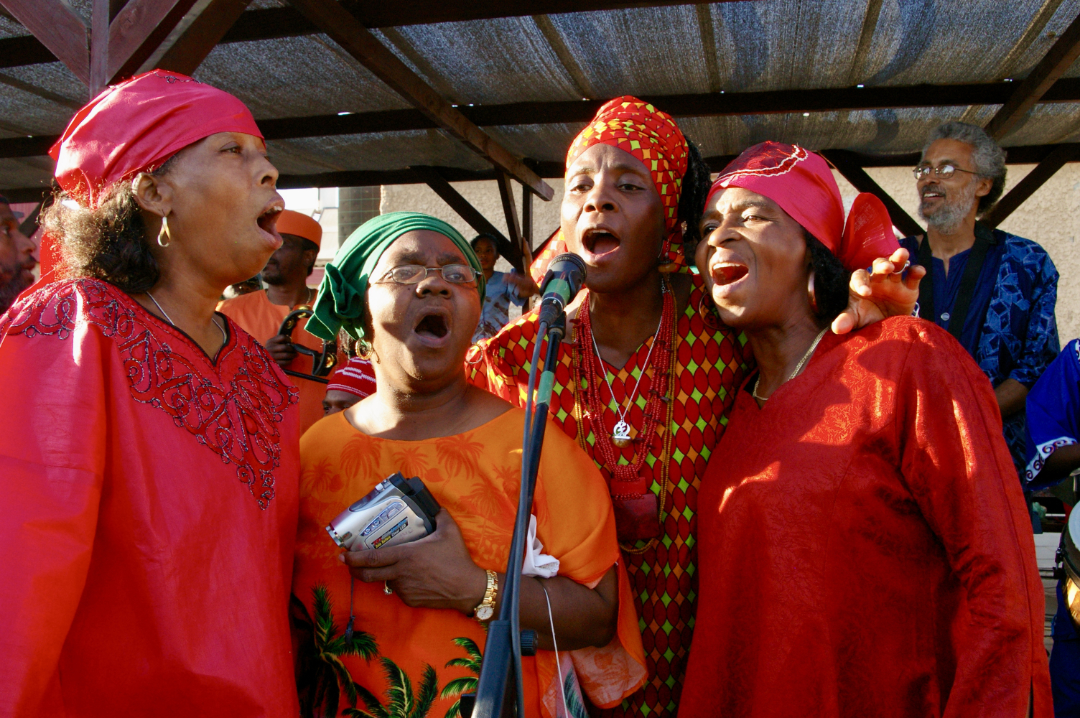
Elisheva, second from left, and Ahdaiyah, third from left, at a community celebration. (Andrew Esensten)
During a long drive last weekend, I popped in my “Eternal” CD and listened to it all the way through, twice. It immediately took me back to 2007, when I lived in the Village of Peace and the album’s songs were in constant rotation in the saints’ houses. It’s a stellar album that pays tribute to Yah, nature, and Africa in 17 tracks that vary widely in style. There are highly-produced songs, then more spare songs, including one with an acoustic guitar as Ahdaiyah’s only accompaniment, and then chanted interludes created just from recordings of her voice layered on top of each other. She wrote the lyrics for all but one of the songs. It’s hard to choose favorites, but here are four that stand out.
Praising Yah Forever
“Woke up this morning, and thanked Yah for my life,” Ahdaiyah sings over a bouncy rhythm. She continues: “So glad to be here in this lovely paradise/ I just want to serve Him with all heart, soul, and might/ Every day I’ll praise Him in my eternal life.” That last line is a reference to the African Hebrew Israelites’ quest to achieve physical immortality.
Where True Life Begins
This one really shows off the beauty of Ahdaiyah’s voice. She does a little scat singing and holds a sublime note at the end.
I Hear A New Sound
Ahdaiyah and another Hebrew Israelite singer, Shmeerah Baht Israel, trade lines in this uptempo number with a catchy chorus.
Africa Yah Come Your Way
“Calling out to all African nations! No longer will we be exploited,” Ahdaiyah sings on this anti-colonialism anthem, which celebrates Africa’s natural resources and promises “a new day” for the continent. The song features Ammi, a Hebrew Israelite singer from Antigua who now lives in Kenya.
There is more to Ahdaiyah’s catalog than “Eternal.” For example, she wrote and sang “One Yah” on the New Jerusalem Fire Choir’s excellent 2001 album “A New Heaven.” And Starlight released at least one album. But none of those albums appear to be online. I hope they will be someday.
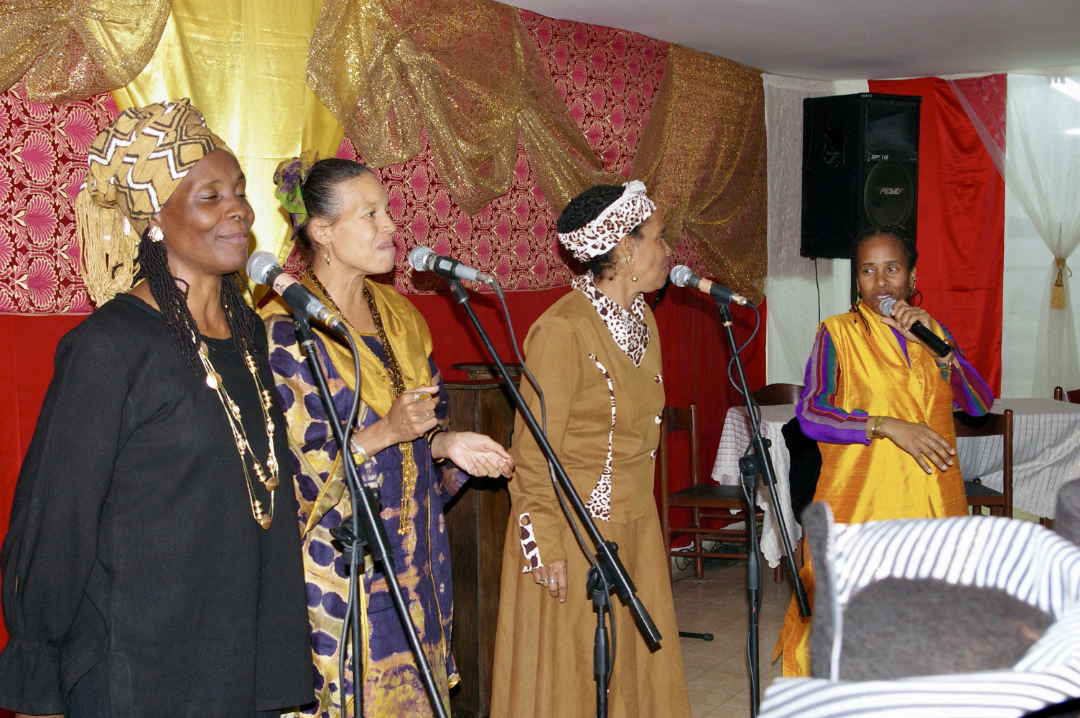
Ahdaiyah, far left, performing with the group Starlight. (Andrew Esensten)
Scanning the liner notes for “Eternal,” I found this testimonial from the late Acote Zehorah, another African Hebrew Israelite songstress gone too soon: “A sparkling jewel from Royal Kingdom Productions [a KOY record label], Ahdaiyah showers down her songwriting and vocal arranging gifts on this latest treasure. This Divine sister brings the glory of Yah’s Kingdom on earth to all who have ears to hear.”
I feel grateful to have been able to listen to, and sing with, the great Acote Ahdaiyah. Her legacy lives on in the musical treasures she gave to all of us.
Thank you to Acote Paziyah for sharing the WKOY interview with me.

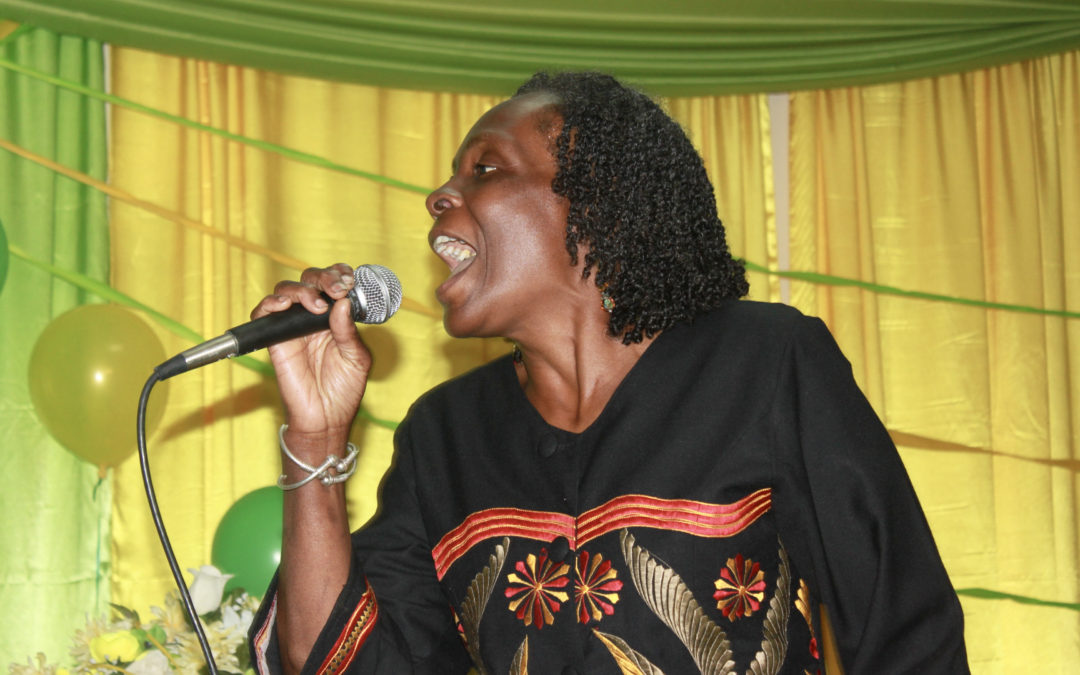
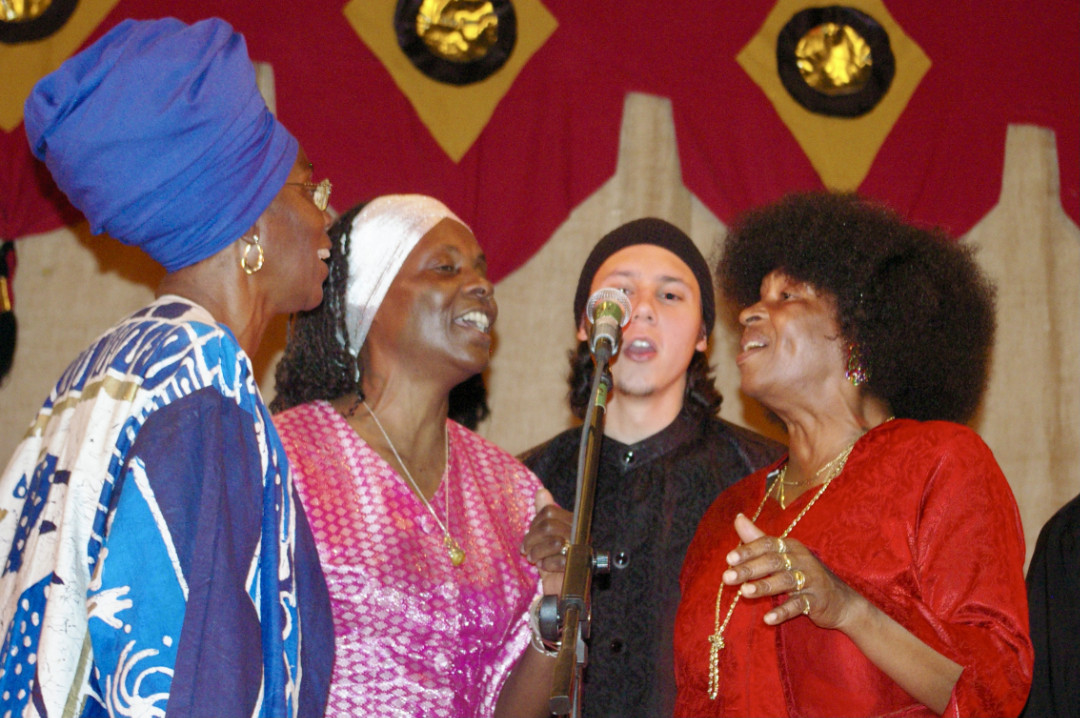
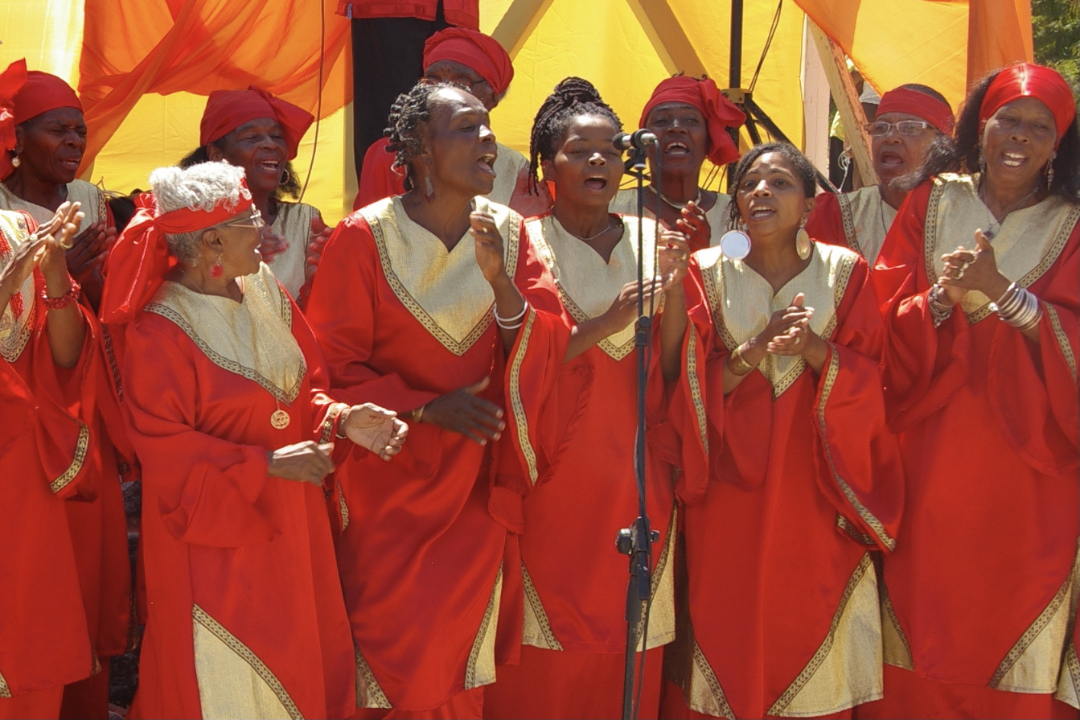
A very warm, personal tribute to a truly gifted artist and precious soul, many thanks!
WE MUST CONNECT ADAYAH’S TRANSITION TO GODEL’S. SAME STRETCH OF HIGHWAY SAME ACCIDENT DETAILS DECADES AGO.
Eternal. I love this album. You can’t just listen to it one time. Been listening to it for years. And always imagined meeting the sister one day. I’d listen and would always say that this sister is cold. Village of peace, where true life begins where 2 of my favorite. Didn’t know her personally, only thru her music. But I still feel as if I did know her.
Very beautiful songs on this album that I’ve just recently found, prays Yah for her gifts and talent.
Todah for putting this article together 🙏🏾🙏🏾🙏🏾
This tribute touches me movingly and warmly as it has captured in a rounded way the multi-talented artist that was AhdaiYah and distinctive personality that she shared. Thank you for this heartfelt tribute. From, London, England.
Well written. Thank you so much for sharing her story. She was such a gift to us all. Truly unique in every sense of the word 👏
She will always be sorely missed ❤
Beautifully written. Thank you Andrew. That is Ahdaiyah and I on “Where true life begins “. I remember that day like yesterday. We didn’t even have a studio. Truly a rare and special occasion that Ahdaiyah and I shared. Rest easy my sister, you are forever in my heart and soul.
I am going to miss my eternal sister and friend. She lives in song and words of praise eternally. Adaiyah, Adaiyah Adaiyah, the eternal.
Thank you……
Beautiful tribute to her todah for sharing
thanks for the article the family of Ahdaiyah Israel (Eternal) are currently doing a gofundme page
https://www.gofundme.com/f/recovery-for-shamreeyah-memorial-for-eternal?utm_source=customer&utm_medium=copy_link&utm_campaign=p_cf+share-flow-1
Todah for sharing. I added the link at the top of the post.
My Emma nothing like her I love her so much and always will 💗💗💗!!!
WOW…WHAT A BEAUTIFUL TRIBUTE. SHE WOULD LIKE FOR EVERYONE TO KNOW THAT HER SOUL LIVES. THIS IS VERY IMPORTANT TO HER THAT EVERYONE UNDERSTANDS THIS. AS SHE WALKS IN POWER AND GRACE IN THE SPIRITUAL REALM WE ARE REMINDED THAT SHE IS A SPECIAL JEWEL THAT WAS GIFTED TO US AND WE ARE VERY GRACIOUS THAT WE HAD THE OPPORTUNINTY TO EXPERIENCE HER IN THIS REALM.